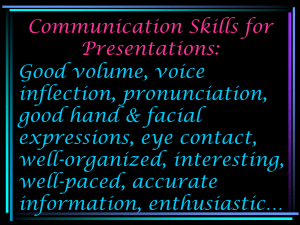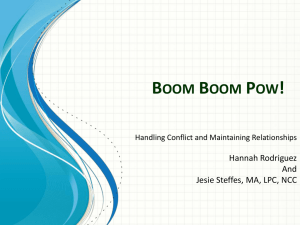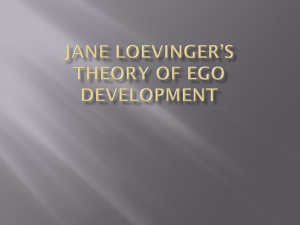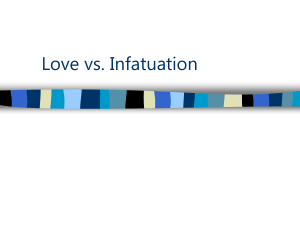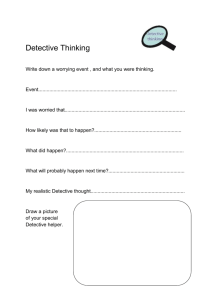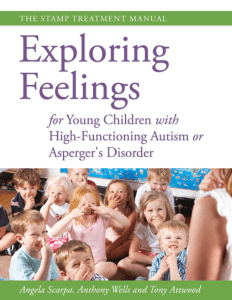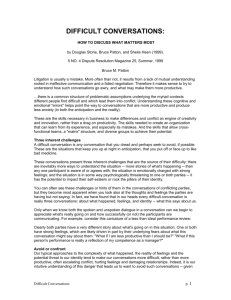social thinking curriculum
advertisement
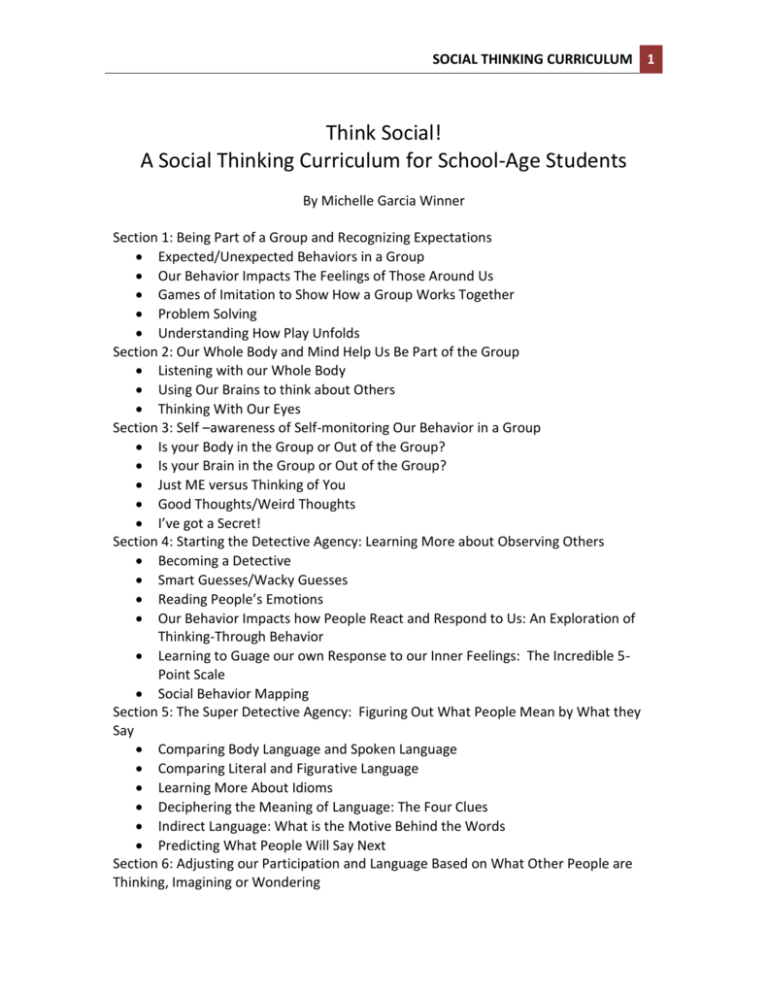
SOCIAL THINKING CURRICULUM 1 Think Social! A Social Thinking Curriculum for School-Age Students By Michelle Garcia Winner Section 1: Being Part of a Group and Recognizing Expectations Expected/Unexpected Behaviors in a Group Our Behavior Impacts The Feelings of Those Around Us Games of Imitation to Show How a Group Works Together Problem Solving Understanding How Play Unfolds Section 2: Our Whole Body and Mind Help Us Be Part of the Group Listening with our Whole Body Using Our Brains to think about Others Thinking With Our Eyes Section 3: Self –awareness of Self-monitoring Our Behavior in a Group Is your Body in the Group or Out of the Group? Is your Brain in the Group or Out of the Group? Just ME versus Thinking of You Good Thoughts/Weird Thoughts I’ve got a Secret! Section 4: Starting the Detective Agency: Learning More about Observing Others Becoming a Detective Smart Guesses/Wacky Guesses Reading People’s Emotions Our Behavior Impacts how People React and Respond to Us: An Exploration of Thinking-Through Behavior Learning to Guage our own Response to our Inner Feelings: The Incredible 5Point Scale Social Behavior Mapping Section 5: The Super Detective Agency: Figuring Out What People Mean by What they Say Comparing Body Language and Spoken Language Comparing Literal and Figurative Language Learning More About Idioms Deciphering the Meaning of Language: The Four Clues Indirect Language: What is the Motive Behind the Words Predicting What People Will Say Next Section 6: Adjusting our Participation and Language Based on What Other People are Thinking, Imagining or Wondering 2 SOCIAL THINKING CURRICULUM Observing Students’ Own Play and Activities o Non-verbal games Building a SHARED Imagination Through Shared Structured Imaginary Sequences Moving from Imagination to Wonder – World Wonderer versus Social Sonder You Know More than you realize Building Language-Relatedness Skills Using Imagination and Sense of Wonder with Reading Comprehension Section 7: Our Language Makes Others Have Different Thoughts and Feelings How People’s Feelings are Related to the Message More about Words and Feelings Defining Social Interaction Friend Files: Our Brains Store Information About Other People as Well as Ourselves Asking People Questions about Themselves The Basics of Maintaining a General Topic Social Curiosity: Wondering About the Person You are with by Asking Questions Follow-up Questions Once the Initial Question has been Asked Supporting Comments: Showing that you’re Listening to what Someone has to Say Add-a-thought: Learning to use Language to Connect One’s Own Life Experiences to Those Described by Others Bridging Questions (Baiting Questions): Asking Questions to Make People Talk About Your Area of Interest Conversation Stoppers: Saying “nothing” gives Others Nothing to Think About How Long is Too Long to Talk? Start Short and Add On Whopping Topic Change (WTC Messes with People’s Minds) Rude Interruption versus Acceptable Interruption Practice Language Concepts: Conversation Tree and Conversation Sheet Talking About Topics No One Thinks People Actually Talk About, But They Do! Initiating Topics: Exploring Ways to Start a Conversation Exploring Thoughts and Feelings of Others: Shared Experiences Exploring Thoughts and Feelings of Others: Unshared Experiences Admitting You Don’t Know: Being Willing to Talk About a Topic That You Don’t Know About Body Language as Part of Communication: Stand up and move! Clarifying Needs and Asking for Help Section 8: And So Much More! Hidden Rules (Also called the Hidden Curriculum) Social Rules Change Across our Lifetime Opinions and Belief Systems Personal Problem Solving and the Size of a Problem SOCIAL THINKING CURRICULUM 3 Exploring students’ Emotions and Thoughts about Being a Person with a Social Thinking Learning Disability Anxiety, Stress and Mental Health Team Members Executive Function Deficits: Weak to Dysfunctional Organization Skills 4 SOCIAL THINKING CURRICULUM



